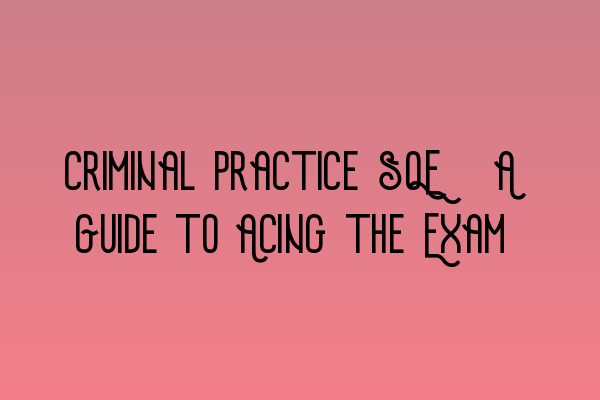Criminal Practice SQE: A Guide to Acing the Exam
Welcome to SQE Criminal Law & Practice UK, where we provide expert advice and resources to help you pass your SQE exams with flying colors. In this comprehensive guide, we will walk you through the key strategies and tips to ace the Criminal Practice SQE exam.
Understanding the Criminal Practice SQE Exam
The Criminal Practice SQE exam is designed to test your knowledge and skills in criminal law and procedure. It evaluates your ability to apply legal principles to practical scenarios, analyze case law, and provide sound legal advice to clients.
To excel in this exam, it is crucial to have a solid understanding of the criminal justice system, criminal offenses, defenses, and the procedural rules governing criminal proceedings. You will also need to develop strong analytical, problem-solving, and communication skills.
Preparing for the Criminal Practice SQE Exam
Preparation is key to success in the Criminal Practice SQE exam. Here are some essential steps to follow:
- Enroll in SQE 1 and SQE 2 Preparation Courses: It is recommended to join comprehensive preparation courses specifically designed for the SQE exams. These courses cover all the necessary topics and provide expert guidance in exam techniques. Click here for SQE 1 preparation courses and here for SQE 2 preparation courses.
- Practice with SQE 1 Practice Exam Questions: To familiarize yourself with the type of questions asked in the exam, practice extensively with SQE 1 practice exam questions. You can find a collection of practice questions here.
- Take SQE 1 Practice Mocks FLK1 and FLK2: Apart from practicing with individual questions, it is crucial to simulate the exam environment by taking full-length mock exams. SQE 1 practice mocks FLK1 and FLK2 are available here.
- Create an Effective Study Plan: Plan your study schedule effectively, allocating sufficient time to cover all the topics and practice regularly. A well-structured study plan will help you stay organized and on track.
- Study Criminal Law and Procedure: Invest time in studying criminal law and procedure textbooks, covering topics such as criminal offenses, defenses, sentencing, bail, and trial procedure. Develop a solid understanding of relevant legislation and case law.
- Review Case Studies: Analyze and review real-life case studies to understand how legal principles are applied in practice. This will help strengthen your analytical and problem-solving skills.
Exam Day Strategies
On the day of the exam, keep the following strategies in mind:
- Read the Instructions Carefully: Take time to read and understand the instructions provided for each question. Pay attention to the command words to ensure you answer appropriately.
- Allocate Time: Manage your time wisely. Allocate specific time limits for each question, ensuring you have ample time to review your answers at the end.
- Answer Structure: Structure your answers logically, using clear headings and subheadings. This will help the examiner easily navigate through your response and award you appropriate marks.
- Use Relevant Legal Terminology: Demonstrate your legal understanding by using appropriate legal terminology and citing relevant legislation and case law in your answers.
- Practice Active Reading: Read the questions and scenarios carefully, highlighting key facts and issues. This will help you identify relevant legal principles and apply them effectively.
By following these strategies and dedicating sufficient time to preparation, you will increase your chances of acing the Criminal Practice SQE exam.
Stay Updated with SRA SQE Exam Dates
It is crucial to stay informed about the SRA SQE exam dates to plan your preparation accordingly. You can find the latest exam dates here.
Remember, success in the Criminal Practice SQE exam requires consistent effort, dedication, and thorough preparation. Stay motivated, stay focused, and trust in your abilities. Good luck!
